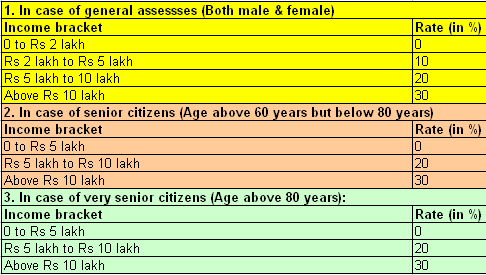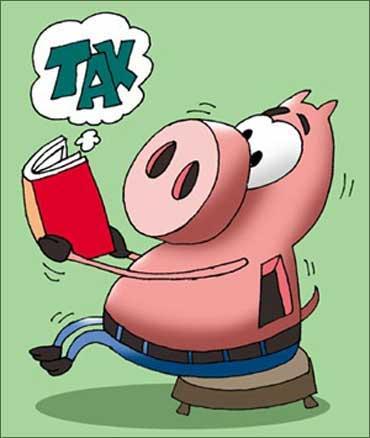Photographs: Rediff Archives Naimisha Parekh
A checklist that will help you save taxes in financial year 2013-14 which begins April 1, 2013 and ends March 31, 2014.
The Union Budget for the year 2013-14 announced by finance minister P Chidambaram did not envisage any major changes in either personal taxation rates or the income tax slabs apart from helping salaried individuals who earn less than Rs 5 lakh and for first time home buyers.
So, will the way in which you saved taxes change when the new financial year comes into effect from April 1, 2013?
Neerav Parekh of HowToBuyBest.in explains.
First, let me explain what exactly has changed in terms of taxation from last year (that is financial year 2012-13):
No change in tax slabs
According to the Union Budget for financial year 2013-14 if your annual income is less than or equal to Rs 5 lakh, you get a tax relief of Rs 2,000.
Let me explain this with an example. Suppose Neerav earns Rs 4,50,000 in the financial year beginning April 1, 2013. He does not make any tax saving investments. Based on Neerav's tax slab, his total tax liability will come to Rs 25,000.
Now according to the provision in this year's budget, Neerav will get a tax relief of Rs 2000 and will have to pay only Rs 23,000 as tax.
The benefit under section 80CCG could earlier be claimed only by persons whose annual income was upto Rs 10 lakh. Now the ceiling has been raised and persons whose annual income is upto Rs 12 lakh qualify for this deduction.
An additional surcharge of 10 per cent will be applicable on persons whose annual income is above Rs 1 crore. This surcharge will be applicable for only one year.
Additional deduction of Rs 1 lakh will be applicable to persons taking first home loan for property worth upto Rs 25 lakh. For such persons, the deduction of Rs 1.5 lakh available under section 24(1)(vi) will increase to Rs 2.5 lakh.
There will be 1 per cent TDS on transfer of immovable property above Rs 50 lakh (not including agricultural land).

How to save tax post Budget
Photographs: Rediff Archives
How to save tax in 2013-14
The question that I am asked most often is that my income is Rs XXXXXXX, what all can I do to save tax? The rest of this article is dedicated to answering that question on tax planning. I have created a comprehensive list of all the provisions that you can utilise to reduce your taxable income.
Tax slabs as shown in the table alongside
Please note:
- On the final tax amount mentioned in the table, a surcharge of 3 per cent will be levied
- An additional surcharge of 10 per cent will be applicable on persons whose annual income is above Rs 1 crore. This surcharge will be applicable for only one year
How to save tax post Budget
Photographs: Rediff Archives
Tax exemptions
1. Section 80 C limit unchanged (Rs 1,00,000)
Deduction of premium paid on life insurance policies taken after April 1, 2012, will be allowed only if yearly premium is less than 10 per cent of sum assured. Before that deduction was allowed only if yearly premium was less than 20 per cent of sum assured.
So, in case your annual premium for financial year 2012-13 or next financial year (2013-14) is more than 10 per cent of the sum assured then the premium paid is not eligible for deduction under Section 80C.
- ELSS
- PPF
- EPF
- FD for 5 years
- Pension plans
- NSC
- Post office savings
- Infrastructure bonds
- Expenditure on children education (Upto Rs 200 per month for up to 2 children)
- Tuition fees (Only tuition fees excluding development fees, donations, etc. Maximum allowed: Rs 24,000)
- Housing loan principal
- Deferred annuity
- Approved super annuation fund
2. Section 80 CCF
Additional Rs 20,000 on investments towards approved infrastructure bonds (withdrawn)
3. Section 80CCD
Deduction under this section can be claimed only if the contribution to your National Pension Scheme account is made by your employer and the deduction is limited to a maximum of 10 per cent of your basic salary. Returns on NPS are tax free, but withdrawal is still taxable. The deduction under sec 80CCD is over and above the deduction available under sec 80C.
4. Section 80 D
Deduction of Rs 15,000 under section 80D is allowed if the same is paid as premium for medical insurance taken for self / dependents or towards preventive health check-up (max Rs 5000). In case any of self / dependents is a senior citizen, the deduction allowed is Rs 20,000. Additional Rs 15000 is allowed as deduction if the same is paid as premium for medical insurance taken for parents. In case the parent is a senior citizen, the deduction allowed is Rs 20,000.
How to save tax post Budget
Photographs: Rediff Archives
5. Deduction under section 80DD
Exemption given for expenditure made for a disabled dependant towards medical treatment/training/rehabilitation. It also includes the LIC/insurance premium paid towards maintenance of such dependant.
Maximum deduction allowed is Rs 50,000 in case of normal disability and Rs 1 lakh in case of severe disability.
6. Deduction under section 80DDB
Exemption given for expenditure incurred on specified disease or ailments such as cancer/aids.
Maximum deduction allowed is Rs 40,000. In case of senior citizens, maximum deduction allowed is Rs 60,000.
List of ailments covered:
1. Neurological diseases where the disability level has been certified to be of 40 per cent and above
- Dementia
- Dystonia musculorum deformans
- Motor neuron disease
- Ataxia
- Chorea
- Hemiballismus
- Aphasia
- Parkinsons Disease
2. Malignant cancers
3. Full blown acquired immuno-deficiency syndrome (AIDS)
4. Chronic renal failure
5. Hematological disorders
6. Hemophilia
7. Thalassaemia
How to save tax post Budget
Photographs: Rediff Archives
7. Deduction under section 80E
Deduction is allowed for repayment of interest component of higher education loan. All education after class 12 is allowed, either vocational or fulltime. But should be from a school/institute/university recognised by the government.
8. Deduction under section 80G
Contribution to exempt charities: 25/50/75/100 per cent depending on the charity and as per approval
100 per cent exemption on donation to political parties :)
9. Deduction under section 80U
Deduction up to Rs 50,000 is allowed in case of permanent disability
In case of permanent disability exceeding 80 per cent, maximum deduction allowed is Rs 1,00,000
10. Deduction under section 24(1)(vi)
Housing loan interest. Maximum investment limit is Rs 1,50,000 (for loans taken after 1 April 1999, for loans before that maximum investment limit was Rs 30,000).
Additional deduction of Rs 1 lakh will be applicable to persons taking first home loan for property worth upto Rs 25 lakh. For such persons, the deduction of Rs 1.5 lakh available under this section will increase to Rs 2.5 lakh.
How to save tax post Budget
Photographs: Rediff Archives
11. Superannuation
Any contribution made by a company to superannuation fund up to Rs 1,00,000 is tax free in the hands of the employee.
12. Conveyance/Transport allowance
Any conveyance / transport allowance given to an employee is tax free up to Rs 9,600 (No supporting bills required).
13. Medical allowance
Any medical allowance given to an employee is tax free up to Rs 15,000 (supporting bills required).
14. HRA
Any house rent allowance given to an employee is tax free up to the minimum value of the following conditions (subject to when an employee can produce rent paid receipts from landlord for the period and if the employee has not availed of tax exemptions for home loan interest / principal repayment):
- 50 per cent of annual basic (40 per cent of annual basic in case of non-metros)
- Actual HRA received
- Rent paid: 10 per cent of annual basic
15. Professional tax
Any professional tax deducted from an employee's salary can be reduced from the annual salary income to arrive at taxable salary.
How to save tax post Budget
16. Provident fund
Provident fund contributions (under section 80 C and subject to an overall investment limit of Rs 1,00,000 ) deducted from an employee's salary are tax exempt.
17. 80CCG -- direct equity investment under Rajiv Gandhi Equity Savings Scheme
Under RGESS a new equity investor will be able to claim 50 per cent of his investment in direct equity as deduction subject to maximum investment of Rs 50,000 and provided his taxable income is below Rs 10 lakh. The investment will be subject to 3-year lock-in.
Government has notified this scheme (RGESS). Mutual funds and ETFs that invest in BSE100 or CNX 100 stocks or PSUs which are navratna, maharatna and miniratna will qualify under this scheme. These investments can be traded over stock exchange after 1 year of investment. New equity investor has been defined as someone who has opened a demat account but has not bought any securities till date of notification of this scheme (22 Sep 2012).
18. Section 80TTA -- savings bank interest
No tax will be charged on interest earned on balance in savings bank account subject to a maximum of Rs 10,000 per year.








Comment
article